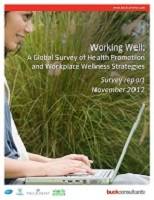March 6, 2013
Staff development still tops European employers’ priorities

European employers are still maintaining ambitious staff development plans, despite the gloomier macro-economic climate. According to a study by Aon Hewitt, the proportion of companies that expect to add new jobs in 2012 has increased to 47 per cent, overtaking the number of companies foreseeing a reduction of their workforce (31 per cent). Explained Leonardo Sforza, chair of the European Club for human resources Scientific Committee: “The slow and painful road to economic recovery is not discouraging successful multinationals from continuing to invest in their human capital and from demonstrating the belief that their people remain the most powerful engine for sustainable growth and innovation.” (more…)


























March 4, 2013
Using the office treadmill to fight the flab
by Sara Bean • Comment, Furniture, Knowledge, Workplace
While shopping recently for a new arm chair, I noticed the prevalence of “snuggle chairs”, marketed as wider than average chairs in which two people can sit cosily together. However, judging by some of the customers checking them out, they appeared much more suitable for use by individuals with a wider girth. You don’t have to people-watch in a furniture store or visit the town of Tamworth, which this weekend the Daily Mail branded ‘”the fattest town in Britain” to notice people are getting fatter. Could a new “office treadmill” help address the obesity problem?
(more…)